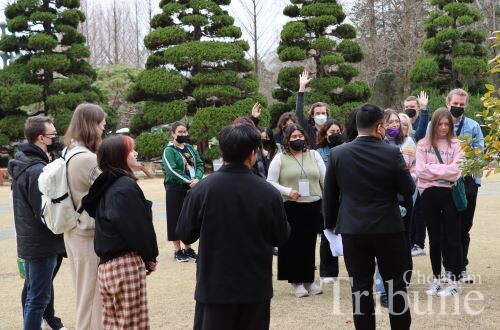
On March 17, the University of Idaho students paid a visit to Chonnam National University (CNU) and attended a special lecture on the May 18 Democratization Movement. 20 students who did an eight-week Korean history course in the classroom at the University of Idaho this semester made the visit as part of their spring break 10-day tour of historic sites in South Korea. Jeff Kyong-McClain (Associate Professor; Director of the Idaho Asia Institute) said, “One of the topics in our modern history class is the democracy movement in Korea. We have talked about the May 18 in class and since it was largely led by students it seems like a topic of interest to my university students so I wanted to bring them to the site that was so important to modern Korean history. We're [in Gwangju] for only two nights so it's rather short, so our main point is to visit CNU and the various memorials [such as] the cemetery and other sites related to the May 18. That's the main thing here in Gwangju.”
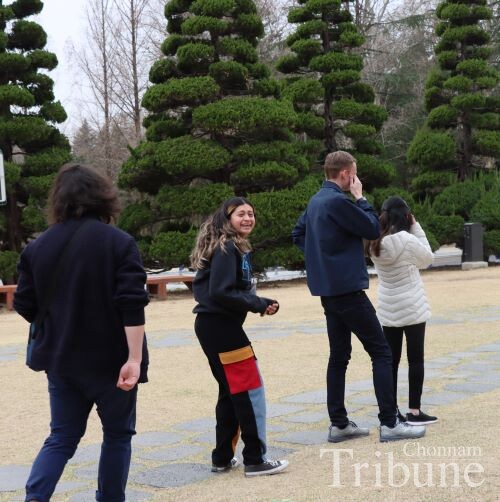
After the special lecture presented by Kim Hyung-ju (Assistant Professor, May 18 Institute CNU), Adriana Varn (Freshman, Dept. Of Music, University of Idaho) said, “I actually did not know about the Gwangju Uprising, so I just thought the whole thing was interesting and really sad a surprising but it reminded me a lot about things that have happened in America as well.” They also joined in activities for language and cultural exchange and took a campus tour with the CNU International Student Supporters at the Office of International Affairs. Jamie Redman (Coordinator for the Idaho Asia Institute) in charge of the tour program said, “We have a partnership with CNU, and this is a history 204 class, and our students love Korea, they are very avid about the culture, the food, the movies and music so [it] just seemed like a natural trip to take.”
By Gutema Saron Samuel, Editor / Lee Younny, Editor
--------------------------------------------------------------
Full interview with University of Idaho participates
<Professor Jeff Kyong-McClain>
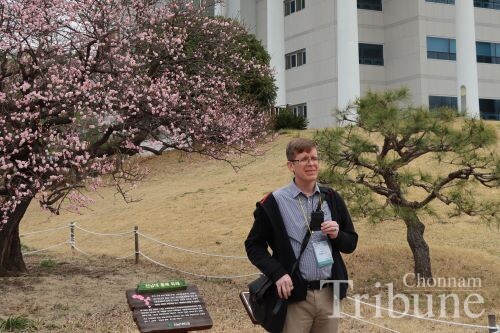
Could you tellus a little about yourself?
My name is Jeff Kyong-McClain, I’m an associate professor of history at the University of Idaho. I’m also the director of the Idaho Asia Institute.
What made you decide to come to CNU?
I have 20 students who are studying Korean history this semester and we did an 8-week course in the classroom at the University of Idaho which then ended with a spring break 10-day tour of historic sites in South Korea. One of the topics in our modern history class is the democracy movement in Korea. We look at it the whole time from the 20th century all the way from the independence movement against Japan and then all the way up to the more recent issues, so we've talked about 5.18 in class and since it was largely led by students it seems like a topic of interest to my university students so I wanted to bring them to the site that was so important to Modern Korean history.
Could you tell us about the places you and your students visited during your trip?
We're [in Gwangju] for only two nights so it's rather short so our main point is to visit the university and visit the various memorials [such as] the cemetery and other sites related to 5.18. That's the main thing here in Gwangju. Then the rest of the tour we've been in Seoul, we've also been in Gyeongju. Even though it’s a modern history class I still feel they should see some ancient history as well, so we I went to the Shilla tombs and Bulguksa and a few things around there. In Seoul we visited Seodaemun prison museum and the war memorial and the DMC and a couple other places so it's been a very busy tour with many historic sites, both ancient and modern on this tour.
Is there something that you wanted to achieve in this tour with your students?
One is that we are just beginning, really at the University of Idaho to build an Asian studies program so one of my big reasons for this very class was just to find something that I believed Idaho students might be interested in about East Asia and sort of get them excited so I just put out word about a history of Korea class and a trip and I was very pleased and a little surprised that 20 students applied very quickly. They wanted to go and they wanted to learn. And of course they’re very influenced by Korean popular culture and that's what made them want to know but the culture sort of is the beginning piece but they actually wanted to know so much more. So that was sort of the impetus, just to get them over here, of course they know all the popular things right now, but “What’s the background to all of this? And where did it come from?” [was the starting point of this trip.] This is what I wanted to teach, and I’m happy to say it’s what students are very interested in.
I read that most of your work is focused mainly on Chinese history, is there a reason you that decided to come to Korea, specifically Gwangju to teach your students about the May 18th uprising?
My university is not a really big university, we have about 10,000 students and in the history department we only have about seven or eight professors, so it’s a small unit. So even though my speciality is Modern China, I’m the only person who does anything [related to] East Asia. So if we if we want to do some other areas that’s also my duty. I’m personally interested in the history of Korea as well, and I don’t like to think about China just by itself, or Koreas by itself, or Taiwan, you know, I’m interested in all the different kinds of interactions, both within East Asia and also the globe of course. One of the things that’s very interesting the question of building democracy, globally and in East Asia. So I think that the experience of 5.18, we can see things like this happening in Taiwan or China as well, in different points of history in the 20th century and beyond. I like to come to a place where we can maybe think about “How does democracy grow? What are the struggles that have to happen to get to that point?” and hopefully my students will be able to think of a comparison. You know, China, Korea, Taiwan, Japan and just kind of think how things work together. And I do like modern history, I teach modern [history] and usually someone says “Oh you teach East Asian History?” they think I must be about kings and emperors and ancient [history] but my own personal interest is more the modern period, that’s where I like to teach and I get most interested in. So this [5.18] is a center of modern Korean history so we should go here.
You mentioned earlier that pop culture has really brought together these students to come to Korea, do you think that influences to learn Asian history, because of the significance of Korean or Chinese pop culture in America now?
Yes, I think definitely that’s the case. Personally, I don’t do very much with pop culture, anywhere, really. But when I advertised this class, we suddenly had twenty students in a very short time, saying “We want to go.” A few of them are history students, but the majority are not history students, they’re students from many many different departments that are in campus. And the thing that they have in common is that they love K-dramas, or they love K-pop or they love the movies, and they know something about Korea from watching those and listening and of course they read a little bit about that but they don’t know the background, but they’re interested, because of that. So that’s definitely good marketing, it makes the students very interested in learning more about Korea. In fact some of them are trying to learn Korean language, but don't have it at our university yet, we may in the future, hopefully in the near future maybe we'll work with Chonnam National we can get Korean language our University. I think there's a very good chance that students may be interested to study for credit for that as Again, because for many of them they're brought in by the popular culture appeal.
<Coordinator Jamie Redman>
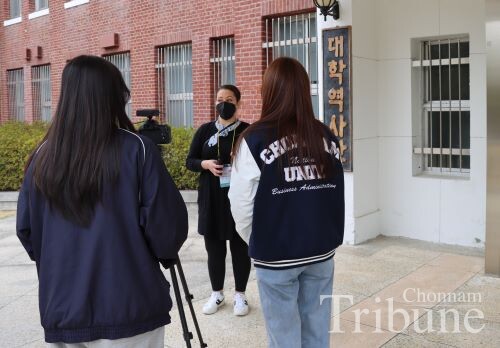
Could you tellus a little about yourself?
My name is Jamie Redman. I am the coordinator for the Idaho Asian Institute at the University of Idaho and I also work for the dean's office and the College of Letters, Arts and Social Sciences and I do the finances and the grants.
What made you decide to bring your students to CNU?
We have a partnership with CNU, and this is a History 204 class, and our students love Korea, they’re very avid about the culture, the food, the movies and music so [it] just seemed like a natural trip to take.
I’ve heard that this is a 10-day trip, and that you’ve also visited Gyeongju, Daegu, and Seoul. Can you tell us more about the places you’ve been and the things you’ve done during this trip?
In Seoul we went to Seodaemun prison museum and we went and saw the palace, went to tons of restaurants, we stayed in a very nice location so we went to a night market. In Daegu we also stayed there for three nights and we took a day went to Gyeongju and went to the tombs and the K-pop museum, and then we went to the palace there, and again, lots of restaurants and subways and trains and then last night we got to Gwangju. We stayed here [lastnight] and we’re going to spend all day at CNU and head back to Seoul.
What is something that you want to achieve during this trip with your students?
We want the students to have a better understanding of South Korea's fight for independence and pertaining to our history and as well as the modern development, how quickly that was, so that they can appreciate the history, but also the Korea it is today.
<Student Adriana Varn>
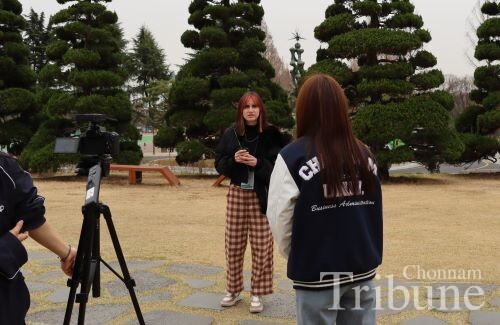
Could you tellus a little about yourself?
My name is Adriana Varn. I go to University of Idaho in Idaho, the United States.
We learned that you’re here as a part of a Korean history class, what made you decide to join this class, and specifically this trip?
I really like traveling, and I like learning about new cultures, and I like the professor.
The Gwangju Uprising is not the most well known historical event in America, so I wondered if there was anything interesting you found in the lecture, or if there was anything knew that you learned.
I actually didn't know about it so I just thought the whole thing was interesting and really sad a surprising but it reminded me a lot about things that have happened in America as well.
Is there anything that you would want to achieve during the trip?
I want to learn Korean. I want to get better at speaking but also learn to appreciate different cultures and try a lot of new things.

